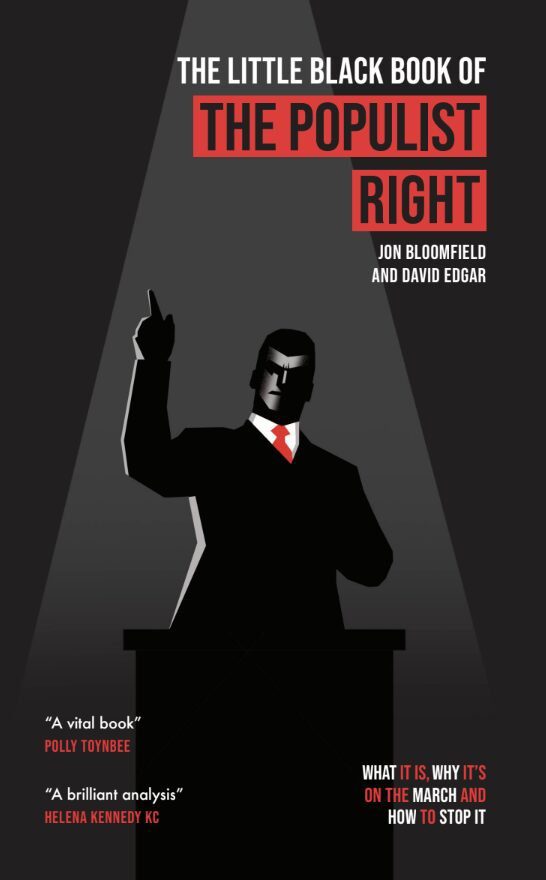This short, highly readable book explores the growing influence of what Bloomfield and Edgar describe as the ‘populist right’. This is a phenomenon they see as related to, but distinct from, fascisms of the past. In about 120 pages of pithy analysis, they not only examine the growth and development of the populist right but also propose a ‘progressive alternative’.
This is certainly a timely intervention, written in 2024 ahead of Donald Trump’s second term as president and clearly relevant to concerns expressed by many in the first months of 2025.
Making sense of the populist right
The book begins by identifying the reasons why the populist right has become salient and identifies as crucial the breakup of the post second world war global order. The neo-liberal politics of Thatcher and Reagan and its consequences feature heavily in this discussion, as does the impact of the 2008 financial crisis. The roots of such populist right-wing agendas, the result of an atomisation of society and the growth of new political anxieties, are therefore found in economic changes of the later 20th century.
While the book offers a short and often polemical critique of this history, this provides a core framework for thinking about the shifting cultural dynamics of society driving the concerns of the political right to more radical perspectives.
The book also considers some of the key ideological precursors to contemporary versions of populist right-wing agendas. There is brief but important discussion on figures such as Alain de Benoist as well as analysis of influential political parties including Alternative for Germany, the Freedom Party in the Netherlands, Golden Dawn in Greece, Front National/National Rally in France, and the Brothers of Italy, all examples of consequential far right political parties in one way or another.
The book clearly makes a case for the impact of European politics on the British far right
Victor Orban is another key figure here, and the book rightly identifies his role as a significant international figure of inspiration. As such, the book clearly makes a case for the impact of European politics on the British far right.
While the book has an international dimension and reflects on the impact of Donald Trump on British and European politics, its focus is on developments within the UK. It explores the history of the far right and the growth of UKIP and the BNP from the 1990s onwards.
It also explores more recent expressions of leading figures in the Conservative Party, as well as Reform, who regularly make clearly provocative statements that fit within the populist right’s register. Developments such as the Sewell Report and responses to it are well discussed, alongside the wider hostile attitudes of populists, and the role of divisive issues such as Brexit.
Assessing and skewering
Moreover, the analysis locates the growth of the populist right not simply in political parties, but rather in ideological voices and a more general culture promoting divisive talking points. Key influencers are assessed and skewered, including those of an older generation such as Roger Scruton.
Moreover, the book critiques viewpoints from figures including Matthew Goodwin, John Gray and David Goodhart, all central ideologues of the populist right in Britain for Bloomfield and Edgar. The role of media outlets such as UnHerd is identified as part of the problem, as is the growth of mainstream media outlets normalising far right attitudes.
While the book is concerned with assessing the big picture, providing a broad framework for mapping and understanding a series of developments that have led to the popularity of populist nationalists, its analysis does raise some questions. For example, it reflects some of the recent phrasing found in media accounts of far right politics that arguably help to normalise it, such as ‘hard right’. Why not just use ‘far right’ if this is what is meant? Terms such as ‘populist’ and ‘national populism’ are also euphemistic.
While the book is right to highlight the politics it focuses on is not ‘fascist’, some critique of these issues could have helped develop further the book’s critical perspective.
A warning of the consequences of extremism
Nevertheless, this is not primarily an academic work focused on definitions and has been written by two figures with a long background in thinking about the UK’s politics and warning of the consequences of extremism. Jon Bloomfield is a well-known political commentator and honorary research fellow at the University of Birmingham, while David Edgar is a playwright whose works such as Destiny and Albert Speer have assessed with the legacy of fascism and its impact on more recent societies.
This perspective helps the text stand out as a piece of analysis developed by two authors deeply concerned about the threats to democracy and personal freedoms posed by the far right.
The exploration, therefore, feels personal as well as persuasive, and this can be most keenly felt the closing chapter sketching out a ‘progressive alternative’. This highlights a set of strategies to challenge the growth of the populist right, and so for a politically engaged readership this chapter will offer some areas for debate and discussion in terms of oppositional approaches.
The Little Black Book of the Populist Right gives readers a detailed map to make sense of the complex terrain that is far right politics
Bloomfield and Edgar’s suggestions include steering clear of developing left wing nativist politics and avoiding some of the ideological purity found in culture wars politics. More complex still are suggestions such as overcoming the consequences of Brexit and addressing the hostility to migration. These are significant challenges to overcome, which is no reason not to present these as areas for action. This closing chapter then reveals the ambition of the authors and the nature of their concerns.
Overall, The Little Black Book of the Populist Right gives readers a detailed map to make sense of the complex terrain that is far right politics. As well as being a valuable primer, it is authoritatively and engagingly written and is a short read that anyone concerned about the rightward direction of politics will find rewarding.






